#i discovered i still had the scrivener file to a novel i started back in 2014
Explore tagged Tumblr posts
Text
Writers will do anything to procrastinate writing, including trying to create 15 conlangs in order to recreate over 400 Victorian era names to create an elaborate character name roll table (despite knowing nothing about linguistics) rather than try and fix the swampy middle of their novel's outline.
...it's me. I'm writers.
#i discovered i still had the scrivener file to a novel i started back in 2014#and was amazed that the half-written first chapter was in fact very readable#and that i had made an actual honest to god full outline#but i took one look at the names i had used and went ‘oh no that has to go’#and proceeded to distract myself thoroughly for a good portion of the week#(also the conlangs are very bad don’t @ me this is probably never seeing the light of day)
16 notes
·
View notes
Note
Do you have any tips or tricks for an amateur writer such as myself? More so related to focus because I'll start something and then stop to do something else than go to pick it back up again only to discover I'm at a block.
I’ve got a lot of short asks/answers to questions like this under the tag ‘writing advice’ so make sure you follow that up on my blog for more answers like this, but essentially, think about what drew you to the story in the first place, and think on that for a while. If you’re not writing professionally, and since you say you’re an amateur (which essentially means you’re writing because you love it, don’t forget!), then focus on what it is about writing that you love in the first place.
I think that’s what lies at the core of any piece of writing - it’s the spark that makes people remember it, and it’s what made you want to write it in the first place. Even just sitting down with a cup of tea (or drink of your choice, but stay hydrated - it’s good for the brain cells, and the aesthetic is neat too :P), and almost meditating on what it is that drew you to the concept in the first place can act like a whetstone, to sharpen up your focus and reboot your desire to write it. It might spark a new character, or a new direction, location, event... or it might solidify what you’ve got already.
Remember that writing anything - including this answer! - takes time and energy and focus, and crafting a whole story (regardless whether it’s something steamy for the fun of it or fluffy or deeply angsty) will take energy. You will be tired or even drained after you’ve done some writing. You may not have the required spoons for the story that day, and that’s ok. Reduce the task size from writing ‘a nebulous amount of words’ to something more manageable like ‘I’m going to get the story moving on by two paragraphs today’. If you write more, great. If you write one paragraph, that’s ok. If you only manage a sentence, it’s still more than you had before, and you’re doing great.
If you’re blocked on something, write down exactly what it is that’s stopping you going forward. I do it with pen and paper because it’s more tangible to me, but you could make a fancy graphic with lots of colours or type it out in a doc or something. I did this with my novel when I hit a major block and it helped me fix it a bit. I’m going to have to rewrite everything, and it’s 150k words long, but at least I know that now!!
So yeah, literally ask ‘why is [character] doing [this activity]?’ or ‘what is the exact function of [insert maguffin]’ or ‘how does [character] feel about what happened in the last bit?’. Play games with yourself and figure out why your characters are doing what they’re doing (or not doing, if you’re stuck!) and sidestep it if you have to. Don’t just say ‘I’m stuck’ and leave it there. If you still care about the story as a whole, figure out exactly what’s causing the block.
You don’t have to write the whole thing in the same order as the finished piece. I’ve got a story on the go at the moment which - at 14 Chapters - is 54k words long, but the Scrivener file with the rest of it tells me I’ve written 88k words. I’ve got chapters that are way way ahead of the current published chapter, and some might not even happen in this story. It’s part of the world, and it involves these characters, but it might not work. It’s ok though because I’m exploring these characters and how they’d react in a given situation, and I can use that to inform other chapters. Write what inspires you in that moment, and fill in the gaps between those chapters or story-beats later.
Remember that a first draft is just ideas on paper. I read something recently (and unfortunately I can’t remember where it was, or I’d cite it!) which resonated - If you are Michelangelo, and your finished story is David, then the first draft of your story is the block of marble extracted from the quarry. It doesn’t have to be shaped and polished at all - it’s just the raw material to work from. It might be disheartening to look at it that way, but if you get to the end of your first draft (even if it’s just a 100 word drabble) and you think it’s rubbish, that’s fine. It’s normal. Let it sit for a day or so, then come back and rework it into something better.
It’s ok if you’re not writing reams and reams each time you sit down to write something. Remember that even a sentence is an achievement, and you don’t have to produce a 50k word novel every time you sit down to write. Take care of yourself, and remember that being a writer isn’t always about creating the actual draft/document. Engage yourself in the world of your story, your characters, make moodboards and colour palettes, design outfits and find out what their favourite foods are. Don’t use that to procrastinate too long, but if you’re struggling with something, taking a new perspective on it can help.
And remember that writing is a craft. You don’t get to be Michelangelo with your first attempts. It takes hours and hours of methodically working on something, of being disciplined and firm with yourself, even if it’s just ‘for fun’. Each time you sit down is like a musician practising a study - you’re getting better each time and with each sentence you craft, so don’t get disheartened!
And enjoy it!
50 notes
·
View notes
Text
Reworking the plot & getting my hands dirty.
Writing journey #2.
Sat 06/03/2021 - Word Count: 28,150 19.38 So, a month ago, today, actually, I started writing a book. For context, I've sorted out scenes and planned my plot; I'm now simultaneously writing my first draft and outlining scenes in more detail - I'm just into act two of my draft and just into act three of the outline.
I included today in my first writing post, which you can find here, but, while outlining, I realised something that will result in a major plot change (even though I probably should wait until revisions, it sorts out the climax I'm currently incredibly vague on, and will help me actually be able to complete the draft), and felt it was time to start a different post, because the other one was long, and already had its own focus.
Previously, I've been setting mildly insane word count goals, and even though I'm sticking to vague targets, I'm going to drop that, because I need to do a major plot change, and that'll mean the word count isn't going up that much for a while.
So, I have my first and second acts good, but while outlining act three, I've realised the event at the start of act three would work better as a climax than the vague battle idea I have. It just seems more original, more effective, but it means I need to shift events around and re-figure the first block of act three. I'll begin tonight, but it's already 8pm, so I'll probably do most of it tomorrow.
Sun 07/03/2021 - Word Count: 28,365 08.24 I'm reworking act three, and I think I may just drop drafting for the moment and focus on incorporating the edits I have in mind, then start drafting over. I know all the advice says not to go back and edit, but this is a big change I can't wait to do, so it seems opportune to just make the others, too.
08.31 I've now finished reworking act three, and I'm much more satisfied with it than I was before. I do now need to go through the scenes again, however.
13.57 Still re-scening. This is frustrating, but I've decided when I'm back to drafting, I'm going to drop my daily minimum to just 500 words - even though I'll make very little progress at that pace, it's more realistic considering I'm about to be plunged back into the world of homework and commuting, and it's something I'll always be able to meet to help me keep in the habit of daily writing. Word count isn't applicable when I'm doing re-scening like today, though.
Something else I've noticed, when I'm writing literally anything, I'm just scribing the words I'm literally hearing in my head, which is a little bit of a problem because where I wrote 'meet' just now, I meant 'meet' but heard 'eat' in my head and wrote 'eat'.
17.07 I feel like I'm finally making some progress - I've been writing on-and-off all day. My word count has actually decreased a couple hundred words since yesterday, but Scrivener is convinced I've written 42,000 words today, which I obviously haven't. I've typed a lot of words, but not that many, not all of which added to that since deleting words takes words off that number. It thinks I've written so many, however, because I duplicated my act one folder twice (then deleted it, obviously, because I don't need three copies of the same act) but Scrivener doesn't take off the words when you delete the file, only when you literally hit backspace.
17.50 Sorting out my climax, I'm realising how bad it was before. Which I guess is good, because it shows internal criticism and growth...? Or something...?
21.04 I've totally planned out the majority of act three, but I haven't finished it because where I'm up to ends with my characters essentially making a game plan, and since I'm not yet sure what that game plan is, I can't outline the bit where they carry out the plan, but I'll do that later. I've incorporated some of the edits I wanted to make, though I've left a couple out because they're less drastic and I'm not sure whether or not to include them, so I'm going to sort that either during or after my first draft.
Since I've made quite a few changes that will affect the parts I've already drafted, I'm going to start my draft over, and reset my word count, but I'll do that tomorrow. For now, Scrivener thinks I've written 42,385 words today, which I absolutely have not, and my word count is currently 28,365, but I'm going to remove every outline and drafted piece I've done so I can start from zero for what I'm going to call draft #1.4, because I already wrote a version of about 40% of it.
God, my word count has gone back to 0 of my minimum 50,000. That hurts. It really hurts. My actual goal is more 70-90K, but 50K is my minimum, so that's what I'm going with for now.
Anyway, goodnight, and good luck me.
Mon 08/03/2021 - Word Count: 820 So, I wrote 820 words before school, then got home, attempted to do some homework and lost all motivation and will to do... anything. Which means I'm very glad I did over my 500 words this morning.
Tue 09/03/2021 - Word Count: 1,367 15.07 I called this a #1.4 draft, but it's more like a #1.3. Anyway, writing is so much less stressful when I'm working from something I've already written - with the first section, so far, at least, I'm basically just editing the writing itself rather than the events because I'm pretty happy, at least at the moment, with my first couple chapters. Very little thinking required.
Also, it's been over 30 hours since I've written because I did my writing before school yesterday, but haven't written yet today because I've got so much work to get done for school. It feels like it's been forever.
16.17 I've finished rewriting chapter one, and still have a lot of fuel in my tank (that's a hideous metaphor) but I think I'm going to cut off today at 547 words, just because I have quite a lot on my plate this week, and I'd like to invest some time in actually reading the book I started eight days ago, and am only 200 pages of the way through.
Wed 10/03/2021 - Word Count: 2,082 I could write significantly more than 500 words most days, but it really is easier to set a minimum that doesn't feel like a strain, so that's what I'm sticking with for now.
Thu 11/03/2021 - Word Count: 2,801
Fri 12/03/2021 - Word Count: 3,405
Sat 13/03/2021 - Word Count: 32,211 07.40 I've just had nothing extra to say the last couple days, which is ironic considering how much I wrote each day of the last post, which went up yesterday! Anyway, it's finally Saturday, and even though I have exactly zero motivation to do anything this morning, I've been awake for two hours already (I recently discovered I like mornings??) and I think it's time to get going. Still sticking to my 500 word minimum, but since it's Saturday, I'm going to invest most of the day in writing, so I should surpass that.
08.20 I don't think I've mentioned yet that I dubbed this WIP Bay Tree in this post. Sorry if I have, but I skimmed this post and can't find it. So, this is about to get messy. I'm basically just cleaning up my prose, but there's so little point doing that when I'm not certain each scene will stay. There's no point editing a chapter unless I know it's sticking around.
So we're reverting, and this is about to get messy. I didn't quite finish my initial draft of chapter seven, because I wasn't sure how exactly the event at the end of it would happen, but I think I'm just going to delve into it. I'm going to add everything, including outlines, back to my word count, finish writing chapter seven, then pick up where I left off in chapter nine. Okay. That's why my word count is jumping around.
And, just like that, I've gone from 4,074 to 28,864. Well, 500 words accomplished. Surpassed, in fact, by just 24,290.
I'm going to aim to just hit 30K by the end of this weekend. I can easily do 1,136 words in two days.
As I've mentioned before, I haven't outlined all the way to the end and through the climax--I have a fairly clear idea of how I want it to do go down, but I'm not sure what I want the characters' plan to actually be, so I currently have 21 chapters, but I'm projecting 23-26, which, at about 3,000 words each, is pretty damn good, especially when it'll just get longer as I redraft (she says optimistically).
Already feeling more motivated now my word count's higher.
09.54 Oh! Also, I logged onto Tumblr today to find someone reblogged my last writing post with a really positive, encouraging comment. It's nice to think I'm bringing someone else a little joy with this.
11.13 And we hit 30K! I'm not quite done for the day, but I do need to go pack. Also, I've been operating under the impression the minimum word count for a novel is 50K, but it's actually 40K, which, though I'm only about 40% of the way to my projected total word count, I'm officially 75% of the way to being able to say I've written a novel.
I'm so glad I've gotten as far as I have, and I just hope I can keep myself going to the end.
12.27 This post is going to look really strange to read - if you're only looking at the word counts, it looks like I've written nearly 27K words today. That makes sense.
Oh, and I finished chapter seven. Like an hour ago.
13.52 At this point, I have literally no idea what continuity things I've already established, so I'm just going by a let-my-future-self-suffer philosophy.
14.36 That's chapter nine done. That leaves chapters 10 to nobody-knows. I'm going to stop writing now, but I wrote nearly 4,000 words today (plus recounting about 20K) so I don't exactly think this cut-off will be detrimental.
Sun 14/03/2021 - Word Count: 35,548 07.58 I’ve written over a thousand words already, and it isn’t even 8am yet. Being a morning person is genuinely the best thing ever as an introvert--I’m asleep when people want to socialise, and awake when no-one else is. That makes me sound like a hermit. I love it anyway, and feel like I’m stacking up for a good writing day. 35K is probably a little overambitious, but what’s life without aspiration?
09.04 As I’m going, I’m realising my plot is actually coherent, and being surprised that I can actually make a story without plot holes (as of yet.)
09.21 And that makes the first eleven chapters drafted!
...And, Houston, we have a problem. Dammit. Eleven chapters, and I haven’t established one of the most important world-building points. Which is especially irritating because it needs to be established by chapter twelve. Unless I can establish it at the start of chapter twelve? We’ll go with that, so I don’t have to go back, then I’ll sort it out in edits or draft two or something.
I’ve just started writing chapter twelve, but I think, having written 2,600 words today already, I need a break. I have less than 500 words until I hit 35K, but I’m going to leave it for now, and come back this evening. I should be able to hit 40K this week.
18.19 And that makes 35K. Chapter twelve is only two scenes, and I’ve written one, but having written 3,000 words so far today, I’m going to leave it until tomorrow.
Mon 15/03/2021 - Word Count: 36,337 17.19 So there’s a crucial plot point just after my midpoint, and I’m not completely sure what to do. I mean, I know what I’m doing--I just wasn’t sure exactly how I wanted it to go, but now I know. The issue is other stuff needs to be pre-established, and I’ve worked out where it needs to go, but I don’t know whether or not I want to go back and write those bits now, or just make note of it and add it in draft two.
I think I’m just going to make note, plough ahead, and deal with it in draft two. I’m trying to figure out exactly how I’m going to operate after this draft: things generally say put it down for a few weeks, come back for edits, then go into your next draft, but I feel like I’m already going to have so many edits gathered by the time I reach the end of this draft, I should just go back into it, but time will probably be beneficial. Not that it actually matters now. I’m only just halfway through an under-draft (by that I mean it’s going to get a lot longer). I’m going to add new scenes in my next draft and generally fiddle with plot aspects, but as quite a linear writer, I think I’m more naturally inclined to just incorporate aspects in a draft rather than as edits. I’m not sure. Does that even make any sense?
Depending on when I finish this draft, I think I’ll plan to pick it back up May 1st, and just see how I’m feeling. But, again, this all depends on when I finish the draft, and how I’m feeling when that time comes.
Tue 16/03/2021 - Word Count: 37,025 I bought my Scrivener license today! Yay!
Wed 17/03/2021 - Word Count: 38,408 08.04 This is mostly irrelevant to my project, but I just wanted to mention the odd fact that I’m definitely a plotter when it comes to longer pieces, but when I do shorter pieces, creative or essays, for school, I hate planning, and just start immediately, then go back and edit. Huh.
Thu 18/03/2021 - Word Count: 38,950 I’m going to edit this, but writing the date just now I noticed I’ve put 2019 for the last three days. It’s absolutely not, and I know why I did that, but still.
14.31 Also, Oxford commas? Found out what they were. Granted, that was actually a few days ago.
Fri 19/03/2021 - Word Count: 40,139 06.55 Even though I wrote 500 words yesterday, I didn’t quite reach my goal of 39K, just because I had to stop writing 50 words off, and by the time I had the opportunity to go back, I just wanted to go to bed. So, today, my goal is to hit 40K words, and officially be able to say I’ve hit the minimum word count for a novel.
Honestly, I’m starting to lose my love for this project. I’m still enjoying working on it, don’t get me wrong, but I’m anticipating finishing it because I know exactly what I want to write next. I feel like I’m mostly still working on it as a lesson, and I know it’s not what I ultimately want to write--mostly because it’s not super high-concept, and high-concept stuff is what I want to be writing. I am still enjoying working on it, I’m just not sure I’ll get to the ‘final line-edits’ stage. But who knows?
10.19 And that marks 40K. We’re in novel terriority, people. And, yes, I could correct that spelling, but I’d like to draw attention to how bad I am at spelling when typing. I’m excellent at spelling in writing, and wrong spellings bother me, but when I’m typing, my fingers are just trying to keep up with my mind, which means I try to type a letter and the one after it at the same time, and often end up with letters in the wrong order and punctuation in the wrong place. Or I just hit halfway between two keys instead of the key I’m going for, and type a wrong letter. Anyway, that was meant to say territory. See? I can spel..
Or I just double the punctuation instead of the last letter.
So I’m definitely not meeting my old goal of 80K words or a finished draft by the end of the month--that’d be another 40K words in just 12 days--but I’m definitely on track to finish by the end of April.
Sat 20/03/2021 - Word Count: 40,692 15.30 God, second acts are hard. I hate being in the middle. At the start, you have novelty, and at the end (not that I would know from experience) you have the knowledge you’re near the end, that you’ve already written most of it.
I’m currently operating the reminder, ‘You’ve written an act before, why not again?’, in hopes that’ll eventually extend to, ‘You’ve finished a draft before, why not again?’ and ‘You’ve written an entire book before, why not again?’
I’ve literally written 243 words so far today, and I just don’t want to. Normally, I sit down, I slog through the first hundred or so words, then pick up momentum. Maybe it’s just because chapter 13 is a boring part to write. Ha. 13. Just my luck.
I’m being nice to myself because a lot has happened in my life over the last few days, but I still want to write a minimum of 500 words, even though most Saturdays I can write more like 3,000.
21.41 I’d like to be asleep. That sounds like fun. Today slipped through my grasp, and I haven’t even written 300 words, but I am going to try to at least hit 500. And then maybe write thousands and thousands tomorrow, but I’m also going to bake a cake, and I’m notorious for being able to make cooking and baking take at least three times as long as is necessary.
21.57 So I got just past 500. Relatively speaking, that’s not that impressive for me, but it’s more words than most people in the world added to their manuscripts today, so I have to give myself some credit. (I’m working on crediting myself for productivity rather than degrading myself for not being productive--I could go on for hours about how much it pisses me off that capitalism teaches us productivity=worth in everything, not just business, but I’m going off on a tangent.)
Sun 21/03/2021 - Word Count: 41,466 08.08 Cakes baked! And I’ve come to a conclusion about how irritating I am to myself--I didn’t fully outline the latter half of act two (by which I mean I have each scene and a purpose of each scene, but virtually no detail) which I can absolutely cope with, but it does slow me down. Anyway, I’m waiting for my cakes to cool, then I can ice them.
14.28 I wanted to write up to 42K this weekend, which I don’t think is going to happen. I’ve written 774 words, so passed my 500-word minimum, but haven’t yet reached 42K, and don’t think I’m going to this weekend. I just don’t have much motivation, which may just be because of the part I’m on, but I’d rather work through this part really slowly then pick up the pace when I get to the part I want to be writing, than force myself to write this section quickly and poorly, then not want to continue into act three. So, sticking to 500 words a day; I may do more later, but I’m leaving it for now.
Mon 22/03/2021 - Word Count: 42,006 17.56 God, I don’t want to write today. I’m going to anyway, because I haven’t yet failed 500 words. They can be a shitty 500 words, but they have to be 500 words. Also, the scene I wrote yesterday? Absolutely getting deleted. But I’m leaving it for now because I refuse to lose those 800 words.
I really enjoy putting edits at the bottom of scenes in brackets and making them unnecessarily wordy so Scrivener thinks I’ve written significantly more words than I actually have.
18.31 Yay, did it. I’m really hoping I can just work through this low spot and don’t have to take a break. I’m on the penultimate chapter of act two, and the first few chapters of act three are really exciting, so I’ll know if I need to take a break based on whether I get motivated when I get to that part.
Tue 23/03/2021 - Word Count: 42,124 16.37 GOD, I need a break. I don’t have motivation, even for 500 words. You know what? I’m just going to make a note of the scene idea I had earlier, and I’m going to take a week’s break. Unless I get antsy, in which case I may end it earlier, but, I’m not going to write again until Tuesday the 30th. Unless I get antsy. FUCK.
I’m just reminding myself breaks are good and important, but I still hate that I’m taking one without finishing my first draft. Tue 30/03/2021, I will be back! Though my word count may increase between now and then as I note down any ideas I have, which I will update with. Okay. Just leave it.
Sun 28/03/2021 - Word Count: 42,150 10.47 Since Tuesday, I’ve made some notes on my phone of little things I want to change, but haven’t added them to my project file, so the word count hasn’t gone up.
Last night, I was just thinking about how badly I wanted to get back to this project, but this morning, I just... don’t. I’ve been thinking it through, and I’m not ready to drop this project yet, but I’m just not happy with what I have at the moment. So, I’m going to add my notes to the file, and then leave it for a few weeks, so I can return with edits in mind, apply them, and then start what I guess will be like a 1.7 draft, because I didn’t finish this draft.
In the meantime, however, I do want to keep writing, so I’m going to start another project in the meantime, which I can work on a lot in the next few weeks because, in a few days, I get a couple weeks off, which won’t be completely free of work, but will give me a lot more time to dedicate to this.
I think I’m going to say I’ll return to Bay Tree (or at least review, if, say, I just want to dedicate a little more time to whatever phase of the new project before I move on) on May 10th, because that’s basically when I get to relax after my exams finish.
So I’ll add the notes I have so far, keep making notes on my phone, and return on May 10th.
Which wraps up this writing update--a new one will come with my new project!
#blog#blogging#blogger#blogpost#blog post#writing#books#book#reading#reader#readerblr#bookblr#writer#write#writes#writerblr#author#authorblr#draft#first draft#story#stories#novel#outline#outlining#writing blog#debut#debut novel#debut writer
1 note
·
View note
Text
Publishing The Novel
Recently, I published my debut novel, Smoke Gets In Your Eyes. And while writing the novel was a challenge in itself, I have to say that I was not as prepared for the publishing process as I thought that it would be.
I knew that it was going to be a challenge, but I can’t say that I thought that the process would be this difficult, cumbersome, and time consuming—-and every other adjective that falls in line with this experience.
For as long as I’ve been working on this book series, I had told friends of mine that I wanted to start my own publishing/media company (check) and to publish my own works (check). I wanted this long before the self-publishing platforms were so accessible and available to everyone who has written a book. My friends thought that I was crazy—-especially those who worked in publishing. They said: No one who was a serious author would dare consider self-publishing, the process alone was too much for a writer to sort through; why torment yourself?
And I might have been a little naive as to how much work was really required of me. It was already a daunting prospect but I was determined to do it. And besides, I can be pretty stubborn and defiant when I want to be. So, I did my best to follow through with the promises I had made to myself.
First, I researched the publishing process by reading lots of articles and books. Through my research I discovered the best program for an indie author to create publishing files is Scrivener. I transferred all of my Word and picture files into this program and was immediately impressed with the program. Scrivener is a godsend for writers because you can organize and maintain so many files and documents related to one project in one place.
Prior to using Scrivener, I had multiple files across several folders that I would have to scour through whenever I needed to find something. Now, I can literally drop it all in one file and it makes my life easier. I wish I had discovered it earlier, but I look forward to writing my other projects using this program.
After taking the time to arrange my files in Scrivener, I then compiled them into one larger file and sought out the help of an editor. I realized, much too late, that my novel was a lot longer than I originally thought. I had about 1000 pages and I needed to get it as close to 500 pages as possible.
My editor, Joan Russell, and I worked to break it down and condense it as much as possible. In the end, I cut it down to about 700 pages, but found that this was too long to publish and had to cut another 100 pages. (Only after several weeks of submitting the manuscript through Amazon’s Kindle Direct Publishing did I realize this…Sigh.)
I did all of the e-book and print book formatting myself using Scrivener after watching various videos on YouTube and the Literature & Latte website (the website for Scrivener). With all of that help, it was still quite the process and a lot of it relying on trial and error. I’m not the most patient person in the world and this process definitely tried my patience on many occasions.
For the book cover, I found a great designer on Fiverr, who designed the book cover for me (see the picture above). I created the book summary and my personal photographer, Sonja Johanson, took the author’s picture of me. We had our little photo shoot one Sunday afternoon, on the street where my main character, Diamond La Rue, lives.
Due to budget and time constraints, I published the e-book first and then the print book on Amazon through their Kindle Direct Publishing service. A few weeks later, I published the e-book and print book through Ingram Spark, essentially recreating the process a second time. The process took several months all together.
My advice to authors who want to self publish and are doing it for the first time is simple:
Be prepared for a long and arduous process. There are many steps to the complex process of publishing. I suggest meditation and prayer before you begin working on it each day.
Read as much as possible about self-publishing and watch as many videos as you can about the process of publishing. I bought books, read articles and watched videos on YouTube, Reedsy and Literature & Latte. I’ve also joined the discussion groups for indie authors on GoodReads.
Make a checklist and take one task at a time. Make sure not to skip any tasks and to complete each one as best as you can. This is your legacy here as a writer and you want your works to be as professional as possible. Most readers expect the worst of self-published books and authors, so you don’t want to prove them right!
Keep notes of how you completed each step and the process that you took. You never know when you will have to go back to make a change or to re-do a task that you have already done. Do not assume that you will remember how to do something you did months ago. (I learned this the hard way!)
Stay positive and remain committed. It is a process but you will get through it. I worked on the publishing of my novel every day after work for a few hours per day. I cut down on watching television, cleaning and any other hobby that I had to stay focused and to keep on track.
If at all possible, market yourself as an author and your book, while you are in the midst of the publishing process. I did some of this minimally because I was so unfamiliar with everything and I had to push back my publishing book date so many times. But on future projects, I will not hesitate to do so.
Best wishes to all of my writers and authors out there!
Naj
1 note
·
View note
Text
Let’s talk about Imposter Syndrome for a minute.
That feeling of “I’m not good enough, I don’t deserve this, I shouldn’t be doing this thing that I love and have worked hard for.” We don’t believe our loved ones when they tell us that actually, yes, we do deserve this, we are good at it. We don’t believe strangers when they tell us “Wow, you did this? This is really good.” We don’t believe our own brains when we look in awe at a thing we created and see that it is beautiful and worthy and wonder how it’s possible that such a lovely thing exists, and that it exists because we made it.
But we do believe the people who tell us we aren’t any good, don’t deserve this, shouldn’t be doing this. Why do we do that? Why do we listen to the people who don’t matter, and not to those who do?
I want to tell a story. It’ll be long, it’ll be self-indulgent, but it has a purpose, so stick with me.
I’ve always liked to write, but I’m not sure anyone I went to school with even knew I wrote. Because I didn’t tell anyone. Because I feared criticism.
In college, I signed up for a creative writing class because it fulfilled a requirement. That professor did not have one kind or constructive word to say to me that entire semester. I did pass the class, but only because, as he told me, it was an intro class, and he could only grade on effort. “While you’re a technically competent writer,” he wrote on my final story, “you lack the talent needed to write fiction, and that can’t be taught.”
I left class in tears and vowed to never write anything ever again.
The following year, Jennifer Crusie did a writing workshop and book signing. I went, because I wanted to get my copy of her latest novel signed. I sat through the workshop, I took notes I knew I’d never use because I wasn’t ever going to write anything, and at the end I made my way to the signing table. I introduced myself, and Jenny asked, “Are you a writer?”
“No,” I said, my face burning. “No, I’m not a writer.” I’m technically competent, but I lack talent.
She looked at me, smiled, and said, “Yes, you are. I can see it in your eyes.” She signed my book, handed it back, and I left the room with my hands shaking because what even was that? When I looked at the inscription she left me, I wanted to cry. “Best of luck with your writing.”
I lack talent.
That was in 2004. By 2009, I’d forgotten both of these incidents had ever occurred, and I got it into my head that I would do NaNoWriMo, because I thought maybe it would keep me occupied while I sat there bored at work with literally nothing else to do.
It was a disaster. I started with an idea that quickly fell apart (I lack talent) and I didn’t know how to get myself back on track (I lack talent). So I made my goal “write 50,000 words” instead of “write something good”, and I met the goal, and then I immediately deleted the file and pretended it never existed (I lack talent).
Over the next few years, I would sometimes have a scene pop into my head unbidden and with no greater context, and it would sit there and poke at me until I let it out. I’d write it down, password-protect the file, and stick it in a cryptically-named folder in the bowels of my computer. I told no one I was doing this, not even my husband. I just wrote my scenes, then hid them like porn under the mattress.
I eventually moved on from writing random scenes to writing fan fiction for a story-based fitness app called Zombies, Run! And one day I wrote a piece that just flowed out of my fingers with zero effort; something that, when I read back over it, barely needed any editing or revision; something that, when I read back over it, gave me chills and made me tear up.
I did this. I wrote this.
I showed it to my best friend. “This is really good,” he said. “Like, really good.”
I showed it to my husband. “This is really good,” he said. “Like, really good.”
I sat on it for a few months. Read over it weekly. And then finally, one day, I published it. I’m still not sure what possessed me to do it. But the ZR fandom is small and lovely and supportive, and I felt safe there.
And people liked it. One commenter told me my writing style is “quite strong and distinct”. No, I thought, that implies talent. Which I lack.
But in spite of my doubts, I published a few more chapters, a couple of standalone stories. The comments kept coming in. “I’m so glad this exists.” “This is really really good.” “I can’t wait to read more.” “Really well written and engaging.”
But…don’t I…lack talent?
I discovered a new mobile game, The Arcana, and published a two-chapter one-off. It’s a small fandom, I figured people wouldn’t mind something new to read even if it was just a silly fluff piece.
“You. Are amazing...just. brilliant!!!!!…you brilliant, fantastic author you.”
Author? I’m not an author. I’m not really even a writer.
“This is the best arcana fic I have ever read. You are amazing. I can't wait for the new chapters.”
I had no plans to write more chapters. But I read that, and I thought about it, and I opened up Scrivener, and suddenly I had three more chapters. They need some polishing before they’re ready for publication, but they’re written, and I have more in my head that can’t wait to escape.
I spent the better part of a decade not writing, because one person—one professor, who didn’t know me, who gave me no guidance and shitty writing prompts that didn’t inspire me, who never once offered me a single ounce of constructive criticism—told me that I lacked talent.
I didn’t listen to a writer I truly look up to when she said that yes, I am a writer, and wished me luck with it.
I didn’t believe my friends and family when they read my stuff and said it was good.
I ignored my own damn self when I read something I wrote and it brought me to tears.
All because one man told me I wasn’t any good.
Imposter Syndrome is a real bitch, and this is where we exit my self-indulgent memoir and talk about why I’m writing this. I’m writing this for you. You, the person reading this, who may be sitting there thinking you aren’t good enough, that no one will like what you create, that you shouldn’t even bother doing it.
Do it.
Please, please do it. Don’t let that voice in your head win. Don’t let that one comment you got online stop you from doing what you love. Don’t let that asshole professor take a decade of creating away from you.
You sit down, and you create. And if what you create doesn’t make you happy? You put it in a folder on your computer or in a drawer in your desk, and you start something new. You may be able to come back to it later and see what needs to be fixed. You may be able to come back to it later and laugh because wow, I was right to set this one aside, because look how good the other stuff is compared to it. You may need something to set fire to one day in a cathartic “fuck you, Imposter Syndrome” ritual.
You go write your story, or sing your song, or paint your picture. You go do it, and if you are comfortable with it, you send it to me so I can tell you how wonderful you are. Because creativity is a tiny spark that is so easy to snuff out, and so hard to build up, and every bit of creativity deserves to be built up and up and up. Don’t be an ember. Don’t be a flame. Be a goddamn supernova, and show this world what you can do.
Because you? Are brilliant. And don’t ever let anyone tell you otherwise.
#imposter syndrome#you are brilliant#i am having some feelings today#and i know i'm pretty new here#but i needed to hear something like this fifteen years ago#and i hope this helps someone who is in that place that i was climb out
84 notes
·
View notes
Note
In the story I'm planning there is a decent sized group of main characters plus recurring characters who have smaller but important roles to play in moving the story forward. With such a large group, do you have any tips for how to organize and prioritize which characters get more scenes and development?
Developing and Organizing Character Arcs

@suksi-vittuun
It’s as if you already knew what I was going to say! Yes, when you’re balancing a lot of characters, your first step is to make sure that each character is crucial to the plot and that their story arc is helping to move your plot forward. Since you included those key criteria in your ask, I’ll assume that you’ve already determined all this.
When you’ve got a lot of characters, it’s assumed that each character (or set of characters) has their own story arc (and get ready; I use the word “arc” a million times in this post). The arc should be able to tell a complete story from beginning to end, but when combined with the other arcs in the novel will form a complete, complex narrative.
For example, if you’re familiar with Harry Potter, then you know his story arc in Harry Potter and the Half Blood Prince, but Draco Malfoy has his own story arc, that mostly happens “off-screen,” where he is plotting to murder Dumbledore. We see his story arc collide with Harry’s towards the end when Snape steps in to kill Dumbledore for Malfoy (and consequently, Snape has his own story arc too! He’s advising Dumbledore on what to do about his damaged hand, and he’s keeping an eye on Malfoy after making the Unbreakable Vow).
Name any character that’s even briefly mentioned in a novel, and you could technically devise a story arc for that character that fills in the gaps of all the times they appear “on screen.”
1. So first things first - make a list of the characters you’re concerned about. If you’re unsure about any of them, go ahead and include them in this list. Then, for each character, write out as much of their story arc as you can. If there are uncertainties in any of the arcs, do your best to fill them in.
There are lots of fun ways you can organize this, depending on the tools you have. If you’re more into free-hand, you can keep your arc notes in a journal, with tabs for each character (use post-it tabs, labeled/colored masking tape, or improvise ways of dividing the notebook). You might also use a binder and have actual dividers. Digitally, you could use separate Word documents, or if you have other writing software like Scrivener, you can use separate docs within your story file, and even have character profiles associated with each.
Now earlier I threw out the terms “on-screen” and “off-screen” and it’s important to note the difference between them. Don’t limit your thinking to what’s actually on the page - think beyond what you intend to show scenically. Think of your novel as highlighting the key points of each arc; you still need to understand more than the key points. This knowledge helps you keep the narrative cohesive, and it helps you make additions and subtractions to the story as you need to (because chances are, during the editing process, you will make changes).
So really elaborate when you write out your characters’ arcs. Throw in information that you think you may not even use, and be as detailed as you can. During this process, think about what each character wants, and what needs to happen in order to get what they want. If nothing else, determine what’s motivating each character as that will help drive the arc and you’ll be able to see it more vividly.
Once you have this, then you can begin to think about actual “on-screen” content.
2. Second, go through each arc and decide what you will actually write into the story.
Now’s the time to decide between on-screen and off-screen content. Only you can decide what scenes to include in your story, but I would advise choosing scenes where something changes, whether this change is something literal (the character getting fired, let’s say) or whether the change is internal (the moment when the character decides to quit). Change may also be seen in relationships - when two characters fight or reconcile. Scenes that reveal some sort of backstory are also good, as are scenes where some important plot detail is discovered.
Do your best to whittle down what you outlined in the character arc (the more characters you have, the harder you should try), but don’t be so selective that you lose the meat of the arc. A novel that only features a few scenes for each of twenty characters might work if the characters are compelling enough, but for a plot centric novel that’s trying to tell a complex narrative, you need more content with each character to get readers invested. Think about Stephen King’s books that feature large casts (It or The Stand), or Game of Thrones, or books by David Foster Wallace - they’re thick. If this is the kind of narrative you’re looking to tell, I’d recommend checking out any of those (a friend of mine also recommended Robert Jordan, especially if your novel is fantasy).
Don’t forget the element of mystery as well. There are some details you’ll want to hide from the readers until the end, so allow yourself some room to exclude the parts of plot arcs that spoil your big reveals. In doing this, you’ll also be deciding what parts (if any) you do show - these will serve as hints, or foreshadowing of what ultimately happens.
Deciding what it is or isn’t important is one of those writer skills that you have to constantly work to master, but if you go into the process with a 50-100 word summary of your book, you can constantly go back to that summary and ask yourself if these things you’re considering including have anything to do with that summary. This will help you answer the question: Should this be in the novel?
Use your character arc docs to list these scenes that you want to include. You may end up with some “maybes” that you’re not sure about, so maybe highlight those in a different color, or put an asterisk or something beside them to remind yourself that you’re undecided.
3. Put them all together.
Now, go to each arc document and copy all the scenes you selected and put them into one giant doc. Don’t worry about the order as you’re going - just get them all in one place first. Then, put the scenes in the order that you see them occurring. You can do this with paper/pen while referring to your screen, or perhaps a separate document, or you could even just copy and paste within the doc you’re already using to reorder them.
Start with the obvious ones, and save any that could happen in multiple places until the very end. By the time you get to those scenes, you’ll have a better look at your story’s timeline and it might be easier to find potential places for these scenes.
I also recommend choosing a unique color to either highlight or use as the text color for each character so you can visually see which characters have the most scenes. If you’re looking at your outline and you only see a couple of green spots, for instance, you can evaluate whether that character is getting enough screen time, or if they even need any.
4. Consider the overlap (and how POV comes into play).
I’ve been avoiding this a little bit to avoid confusing everyone, but you also can’t forget that some arcs will overlap with one another, and you’ll have characters that will “pop up” in different arcs, or even be “missing” from their own arcs. The key is determining whose arc each scene is mostly contributing to. The scene may be advancing both arcs, but the idea is choosing whose arc it advances more.
Going back to my earlier example, Harry and Malfoy each have their own arcs, but Harry often shows up in Malfoy’s and vice versa. Despite his “on-screen” absence, I would argue that the scenes where Malfoy fails to kill Dumbledore (the bewitchment of Katie Bell, and when Ron gets poisoned) do more to advance Malfoy’s arc than Harry’s, as Malfoy’s continued failures affect his mental state, as well as his position with the Death Eaters. So even though we don’t see Malfoy on-screen (since the perpetrator is meant to be a bit of a mystery, and because we’re from Harry’s POV), these scenes would be listed under Malfoy’s story arc.
When it comes to prioritizing which characters you should develop more, that’s your choice. Once you’ve presented the bare minimum for each character, or the selected scenes that tell the story arc sufficiently, then you get to decide which ones we delve deeper into. There were enough scenes in Half Blood Prince to sufficiently tell Malfoy’s story arc, but if JKR had wanted to, she could have chosen to include scenes from Malfoy’s perspective to advance his development and garner more sympathy from readers. As a writer, she made the choice not to do this. As such, it’s your decision which characters you want in the spotlight and which you’d rather the reader be more distant from.
So the bottom line here is that it’s not simple. Writing novels with big casts never is, so prepare yourself for the monumental task in front of you. Accept that you might be confused about what you’ve got going on quite frequently (and then reward yourself with candy anytime you feel like you actually have your shit together). Outlining is key, and hopefully this blog post helps you get closer to establishing an outline.
5. Lastly, let your outline guide you, but don’t let it control you.
Once you’ve put all those scenes in a potential order, you’ll find that you may add new scenes from your arcs that you dismissed earlier (or ones you come up with later), and you also might delete ones that you used to think were super important. Allow yourself this freedom, because much of what you do in your draft is difficult to determine until you start writing it.
Mia also just did a post on managing large casts of characters with a few tips that may be helpful to you when building your cast. We also have a few other posts on large casts if you want to check those out too.
Good luck with your epic story!
-Rebekah
P.S. Thank you Megan for discussing this ask with me ;)
720 notes
·
View notes
Text
Word tutorial: How to track changes in documents | lynda.com
See on Scoop.it - Write On!
youtube
This tutorial covers the ins and outs of change tracking in Word 2010, both for working alone or collaborating with others. Watch more a
Judith van Praag's insight:
More than a decade ago I got a call from a parttime editor at the International Examiner, the Seattle newspaper I was the Arts writer of at the time. She wanted me to make some changes and talked me through my article. At some point she said don't you see the red underlining? I had no idea what she was talking about. Turned out we were looking at files in different Writing Programs. I had to get Word, that was clear.
Not long after I ceased working for the newspaper, because I wanted to write a book. I'd been a beta user of Scrivener, but found that the program, although promising had to steep a learning curve. So I created all my sections in Word.
In 2010 I wrote the first draft of my novel Forgiveness during NaNoWriMo (National Novel Writing Month). After finishing with 80,000 words, far beyond the required 50K I received a perk, the latest version of Scrivener for 50% of the usual price.
With the help of special PDF on how to master Scrivener I became adept at using the program, and fell in love with it.
Until we were burglarized at the end of August 2013. The thieves took my iMac and my MacBookPro.
I got a new laptop, opened my Scrivener files, and SCHWOOSCH, the ones I'd been working on for seven months were jeopardized. That's when I discovered the major Scrivener glitch.
YOU CAN'T HAVE FILES OPEN ON DIFFERENT DEVICES!
Since I had not closed out of Scrivener when I went to the dentist on that day in August, the files were still open. I'd lost seven months of work.
Yes, I had back-ups everywhere, on clouds, in dropbox, on Exterior Hard Drives, on thumb drives, on discs, you name it. But the latest work was gone. Turned off, I shelved Forgiveness (perhaps a pun is in place). But I still loved Scrivener and continued using it for all the next projects I started.
And now that I'm ready to finish a memoir for real, I've learned about the benefits of Word. I'd never given Word the time of day. I used it as a simple word processing program, but never looked beyond the basics, well, a bit more than that, but not much more.
Thanks to developmental editor Andrea Hurst I learned how to track changes in documents created in Word.
Hallelujah!
And here you go, check out the tutorial created by Lynda.com
0 notes
Text
Screenplay to Novel: 5 Steps to Novelizing a Script
Script’s Editor Jeanne Veillette Bowerman challenges screenwriters to take on the NaNoWriMo challenge by adapting backwards, screenplay to novel.
Click to tweet this article to your friends and followers!
As many novelists know, November 1st marks the launch of National Novel Writing Month, a personal challenge to write a 50,000-word novel in 30 days. But what about a screenplay? Is there any value in turning a screenplay into a novel?
Absolutely. No writer should ever box themselves into one medium. Storytelling is changing, even for screenwriters. Sure, we dream of seeing our scripts come to life on the big screen, but that is not an easy task. It’s not impossible, but it could take millions of dollars and a champion advocate to make that kind of dream come true.
However, you don’t need to let your story rot on your hard drive. Let that baby free and adapt it into a novel yourself. Hollywood loves intellectual property. Just look at the latest movies and TV shows. Most are adapted from books or short stories. It’s time to shift your game plan and double your odds of success.
That goes for novelists, too. You should be considering the potential of adapting your novels and short stories into features and TV pilots, or the very least, think about structuring your stories to attract Hollywood producers. But I’ll address bringing you all over to the dark side when Script officially moves to Writer’s Digest site by year’s end. (Yes, we’re joining forces to bring all storytellers and resources together on one site!)
Do I hear adaptation skeptics out there? Well, zip those negative lips. Professional screenwriters are even doing it. Yes, many pro screenwriters are also writing novels: Daniel Pyne, Doug Richardson, John August, the Thornton Brothers, Joe Gazzam, my own writing partner, who is a ghost writer for Hollywood, Unknown Screenwriter, plus many more. While they write screenplays for studios and production companies, they are taking the leap into prose, some to ultimately adapt into TV series or features. By putting their stories on the bookshelves now, they get the satisfaction of sharing their art while growing their fanbase.
Writers write to emotionally move people, but you can’t move anyone if no one is reading your stories. NaNoWriMo is the perfect opportunity to give novel writing a shot since your script serves as a fantastic outline.
If you’re still looking crosseyed at my suggestion, please stop and take a deep breath. Open your mind and see the change in the industry before it smacks you aside the head. You already have everything you need. You just need to put your big-girl panties on and dive into the challenge.
Change is scary, but allow me to suggest something even scarier: No one ever discovers your screenplay or your talent as a writer. Read that again. That’s a terrifying thought. I’m sure you’ve had friends ask, “Have you written anything I’ve seen?” Then they scoff because you haven’t. Does that mean you aren’t a real writer? Now imagine your friends ask you about your scripts, and you can hand them a book adapted from one. Physical proof of your talent. Imagine how that would feel.
You can do this.
As a screenwriter, you’re trained to write cinematically and to make stories a “fast read.” That’s what we do. We pull the studio reader in immediately and make then have to keep turning the page. Trust me. That skillset translates into great novel writing. Not to mention, with society’s attention span being that of a gnat, an increasing number of readers want novellas and stories they can read in one sitting. The trends are always shifting, and it’s important you, as a writer, try all angles you can to stay ahead of them.
Another benefit is when you dive deeper into your story, you might find new characters, new sub plots, and new perspectives you can then take back to your original screenplay in its next rewrite. Whenever I have explored new scenes, even if just for the heck of it, those shifts taken off the “main path” have always led to a richer writing experience.
But before you start writing, be sure the story works as a novel. Not every screenplay makes an excellent book. You want a story where you can crawl in the characters’ heads and a reader can sink into for longer than the two hours it takes to watch a movie.
30 Tips for Writing a Book in 30 Days
If you don’t have a script that would work as a novel, then use these 30 days to get a first draft of a new screenplay done. Challenge yourself to write every day. After all, it takes 28 days to develop a habit. After the 30-day challenge is over, you’ll have a new routine that promises to get more scripts written in the coming year.
Anyone who reads my Script column regularly knows I’m no wimp when it comes to a challenge. Just the mere thought of one makes my skin tingle with delight. I’m a competitive freak when I need to be, even more so when the person I’m challenging is myself.
Instead of telling you all about the values of doing NaNo, including simply getting in the practice of writing every day, you can read a piece I wrote, sharing the 10 lessons I learned from NaNoWriMo.
How do I turn my screenplay into a novel?
I polled some of my professional screenwriter friends who have done just that. Here are their top five tips:
1. The hard part is done. You already have a story with structure and characters. That’s one hell of a detailed outline for a novel. Copy and paste that puppy into a Word file or Scrivener.
2. Decide on a Point of View. As screenwriters, we always write in the third person, but if you’re writing a novel, you can decide whose point of view you want to tell it in… the antagonist, the protagonist, the third person or the first person. You can even use a different character’s point of view for each chapter. Your story could be more interesting told from a specific character’s perspective.
6 Tips for Choosing the Right Point of View
3. Start with a skeleton. Take your script and transform it into the prose of a novel, one scene at a time. Don’t worry about descriptive prose or getting into the characters’ heads yet. Just put the basic story down into novel form. The average novel has an 80,000 word count (but can be more or less, depending on the genre). Once you get the skeleton of your story down, you’ll have a better idea of how far off you are from the mark.
4. Beef it up. Now is the time for fun! The benefit we have as screenwriters is our natural ability to write visually. Take off your screenwriting shackles and let loose with the flowery prose and start crawling inside your characters’ heads, telling their thoughts and feelings… things we can never do as screenwriters! At first, it won’t seem natural, but in time, I promise, you’ll start enjoying the freedom to explore your story mentally rather than visually.
5. Fill in the holes. Screenwriters are trained to write lean and mean. Go back and find those scene darlings you had to cut in order to get your script to the 110-page sweet spot. Oh yeah, you can add those suckers back in! You can even add other subplots and characters; though I’d still be sure any subplot you add relates to the theme of your story.
Now, I’m not suggesting you write the next War and Peace. Quite the opposite. A lot of successful, self-published ebooks are written efficiently in order to make the books a quick read. The readers of today often want to read a book in one sitting, and if they like the author, they want their next book to be out in a month or two. As a screenwriter, you’re the perfect writer to take advantage of that market. Grab that pile of spec scripts and start adapting!
Bottom-line: It’s hard to get a script produced, especially since the 2008 market crash. But as a novelist, you can get your work in the public eye, even by self-publishing, and possibly get interest in your script from the exposure. Again, Hollywood produces tons of book adaptations every year. Why not yours?
You really have nothing to lose. In fact, you might even discover you’re good at being a novelist and branch out into a new form of writing. Now, do you see why Script and Writer’s Digest are merging? We’re planning on world domination of all things writing, so get ready for the ride!
As I always say, writers write. My new career plan is to write both novels and scripts. I want to move people with my words, and I can’t do that if they’re sitting on my hard drive waiting to get produced.
How to Write While Managing a Full-Time Job
But how can I find the time to “win” this challenge?
The disclaimer: Most of us work full-time jobs, and it’s hard to imagine how we’ll find the time to write 50,000 words in 30 days (it breaks down to 1,667 words per day). My plan is to simply write something… anything… every single day. Even if at the end of the 30 days I only have 20,000 words, that’s 20,000 more than I have today. I’d rather have 20,000 quality words than 50,000 crappy ones. I’ve done that, too. Even that had its benefits. To hit the 1,667 word count a day, I let my characters run wild in my mind and did stream-of-consciousness writing. They took me places I never imagined, which are now part of a new outline of that novel.
I love the pressure of a deadline and ticking clock. In my post about the lessons I learned in NaNoWriMo, I describe a word-churning program called Write or Die. You enter the desired word count for that writing session, as well as the time you want to write it in. While you’re writing, the program will start honking at you if you slow down. It’s a fun way to keep the pressure on!
Consider joining me in the challenge and find me on the NaNoWriMo site, username jeannevb, Add me as a buddy. We can keep track of each other’s progress, send messages of encouragement, and build a whole new community of writers to support our efforts. I made amazing friends when I took the challenge in 2011 and 2013, and I know I will only widen that circle this year.
Put your NaNoWriMo usernames in the comments below to connect with each other!
Find more great Writer’s Digest articles on navigating National Novel Writing Month!
Need help crafting a novel? Save hundreds on our bundle of products to help: 30 Days to a Finished Novel Kit
BUY NOW!
The post Screenplay to Novel: 5 Steps to Novelizing a Script appeared first on WritersDigest.com.
from Writing Editor Blogs – WritersDigest.com http://www.writersdigest.com/writing-articles/by-writing-genre/script-writing/screenplay-to-novel-5-steps-to-novelizing-script
0 notes
Text
PitchWars #PimpMyBio
Hi, I’m Amy.
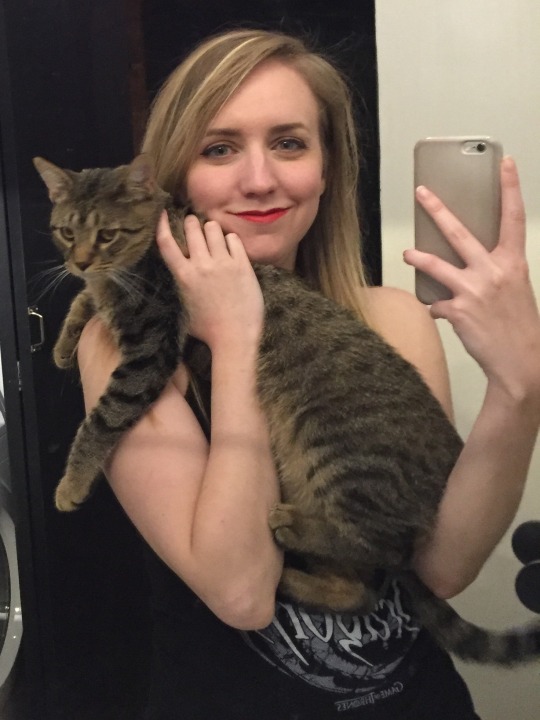
This is my first ever PitchWars, and I’m hyped af.

About My Manuscript
Title: More Fierce Than Fire (title comes from here)
Genre: YA Contemporary Fantasy
Word Count: 75,000
Comps: The Young Elites by Marie Lu, The Story of Owen by E. K. Johnston
Sixteen-year-old Abigail Hunter, the best healer in Grady Hospital’s Magical Trauma Ward, has a secret. Ten years ago, Abby wished her mother dead on the worst possible day—the day dragons awoke and brought magical powers to everyone in the world. Abby's angry wish became the powerful spell that ended her mother's life.
Abby has devoted her life to healing magic to atone for the sins of her past. Though she’s still afraid of losing control, she has become increasingly aware of the threat the dragons pose and frustrated that she is helpless to do anything about it. Hoping to develop the skills required to protect others, she joins a new United Nations-sponsored program which promises to give her the chance to work directly with the dragons and their victims. Training with some of the best young mages in the world, she prepares for the war to come.
And the war is coming. When a group of unregistered mages leads the dragons in a deadly attack on American cities, Abby must decide if she’s ready to join the fight against them, or if she’ll be stuck reliving the mistakes of her past forever.
A Note About Diversity
Diversity is extremely important to me in my writing. Most of the characters in my book other than my MC are POC and/or LGBTQ. I did not feel that I had the skill or experience to write a first-person perspective for a POC/LGBTQ character, so I didn’t. However, I have been fortunate to grow up in an extremely diverse place, so I’ve included a number of POC/LGBTQ characters (loosely) based on real people. I feel that authentic, thoughtful representation is important in all forms of media and am hoping to find a mentor who feels the same.
MS Pinterest Board
Novel Aesthetic (Quotes & More on My Instagram)

About Me
Let’s start this the way you did back in pre-school. My name is Amy Lanchester, and I’m twenty-eight years old. My favorite color is pink (and has been since long before millennial pink became a thing #ILikedItBeforeItWasCool). More Fierce Than Fire is my first novel.
I’m “from Atlanta” in the way that most people who say they are “from Atlanta” are “from Atlanta,” in that I actually grew up about thirty minutes away and only moved to the city as an adult. I set my book here because I feel that entirely too many books are set in NYC, London, or Chicago.
I’ve been funemployed for the past year.

I started my first “real job” before I’d even finished my master’s degree, and after working there for three years, I decided I wanted to do a few things before I’m too old/settled. So I’ve traveled Europe:
ALL
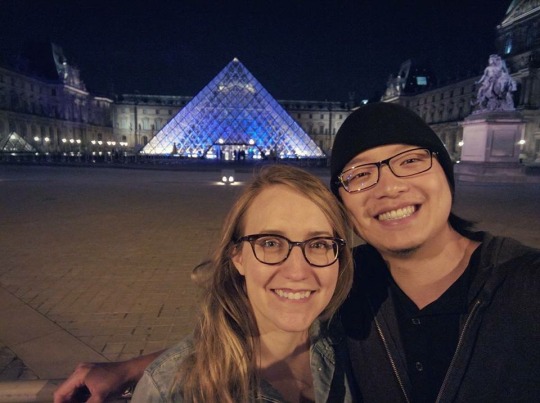
OVER

EUROPE

and the western United States:
ALL

OVER
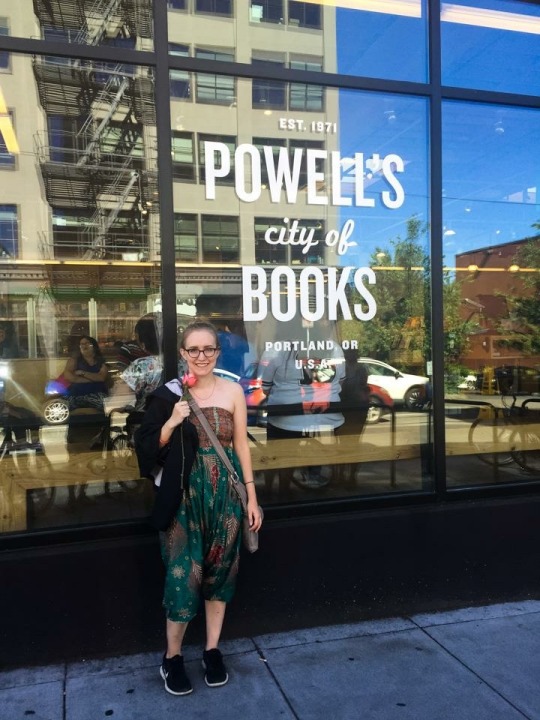
THE

WILD

WEST

and I finally achieved a life goal in writing this book. I highly recommend taking a “gap year” to anyone who is able.
I live with my boyfriend and our beautiful asshole of a cat, Bret. We found him about two years ago at a local McDonald’s hanging out near the drive-thru. We went back the next day and lured him out with bits of hamburger, and he’s been our lovable jerk of a pet ever since.

Why You Should Mentor Me
- I am really, really serious about this. I’ve devoted an insane amount of time, energy, and research on this project in the past year and fully intend to see it through all the way. I love and believe in my work.
- I am crazy meticulous. I come from a STEM background, and I use the tools I learned there in my work. I’m a firm believer in spreadsheets, outlines, automation, and using technology to the fullest. I am a grammar nut who googles everything she isn’t sure about and spends hours nerding out reading style guides and grammar blogs.
- I take criticism well. I’m a fairly self-critical person who is realistic about her flaws and shortcomings. Though I love my work, I know it is far from perfect, and I am greatly looking forward to receiving a thoughtful critique. You won’t hurt my feelings. I want my work to be the best it can be, and I know that takes knowledge and experience I don’t have.
Writing History
I had the idea for my MS in May 2016. It was inspired by this tumblr post which made its way to reddit (a site I love and hate and spend entirely too much time on):

I decided I could write that book, and so I did. I wrote a prologue that I cut and part of the first chapter on a train from Warsaw to Berlin in September. I made an outline when I got back home in October, and I wrote the rest of the book during NaNoWriMo 2016. I did finish my 50,000 words in November, but the book wasn’t done. I had a completed (terrible) first draft of about 55,000 words by the first week of December.
My first draft was mostly just dialogue and action. I discovered that I hate writing description as much as I hate reading it. So my next several drafts mostly involved adding description to scenes, and it took forever. I cut several scenes and characters entirely during this process and added a few more scenes and characters, bringing my final word count to 75,000 words. My current draft contains very little from the original NaNoWriMo draft, and believe me, that’s for the best.
Writing Style
I am definitely a planner. I would have gotten nowhere without my outline or character spreadsheet. However, most of my character’s personalities came out through writing their dialogue. I used dialogue (that I went back and cut because it was boring and redundant) to solve plot problems and work out motivations in scenes. If I ever got stuck, I just started writing a conversation between my characters, and it solved basically all of my problems.
How I Write
I started writing in Scrivener, a program I’d gotten for free when I worked at the Apple Store back in 2010. It helped me a lot with organizing scenes and research. I transitioned to Google Docs after a save file got corrupted and I spent an evening panicking that I’d lost everything (I hadn’t, thank God). Google Docs sucks for long documents, but it saves to the cloud every few seconds, so I suffered through it.
I write at night almost exclusively. My best creative work comes after midnight, and usually once I’m already in bed.

I dread having to get back on a normal schedule because the night owl life is best for my writing.
Favorite Writing Resources
- Excel/Google Sheets
- Grammar Girl
- Chicago Manual of Style (I’m too poor to actually own this, but I use their FAQs and this hyphenation table all the time.)
- Hemingway Editor
- Grammarly
- ProWritingAid
Upcoming Projects Preview
I have so many ideas. I think of new project ideas every day, and I constantly struggle not to get distracted by my newest, shiniest concept. Here are a couple of things I’ve started planning:
- Shakespeare’s plays retold in a combined setting like into the Woods or Marissa Meyer’s The Lunar Chronicles. A central, overarching series plot with individual volumes devoted to some of the plots of the original plays. I’ll be combining side characters from one show with main characters from another.
- A space opera/sci-fi series centered on a girl who rescues an alien from a hostile species at war with Earth’s space empires. The aliens have superior technology and are annihilating the space colonies, but we can’t communicate with them. My MC and her android nanny devise a method for rudimentary communication and are captured by government forces who have ulterior motives.
Stuff I Like
Books
- Harry Potter, obviously. Prisoner of Azkaban is my favorite. I spent years convincing myself I was a Gryffindor like Hermione, my hero, but I’m really a Ravenclaw.
- The Young Elites by Marie Lu
- Exit, Pursued by a Bear by E. K. Johnston
- A Song of Ice and Fire by George R. R. Martin
- Hitchhiker’s Guide to the Galaxy by Douglas Adams
- Lolita by Vladimir Nabokov
- 1984 by George Orwell
- Flowers for Algernon by Daniel Keyes
TV Shows
I freaking love TV.

I’m convinced that if Ray Bradbury had lived in the Golden Age of Television that we’re living through, he would never have written Fahrenheit 451.
A short list of shows I love: Futurama, Buffy the Vampire Slayer, Parks and Recreation, BoJack Horseman, Game of Thrones, The Handmaid’s Tale, Breaking Bad, The Wire, Jessica Jones, Broadchurch, Steven Universe, Stranger Things, You’re the Worst, Crazy Ex-Girlfriend
Musicals
I love Broadway so much.

I’ve been in (school productions of) Once on This Island, Les Miserables, Into the Woods, and Dreamgirls. Other shows I love include Hamilton, The Book of Mormon, The Last Five Years, Aida, Phantom of the Opera, Evita, The Sound of Music, Fiddler on the Roof, and West Side Story.
Cosplay
I picked up cosplay a few years back. I didn’t own a sewing machine, didn’t know how to sew, and had limited crafting experience. I taught myself using books, online tutorials, and YouTube videos. Some of my projects:
Daenerys Targaryen from Game of Thrones
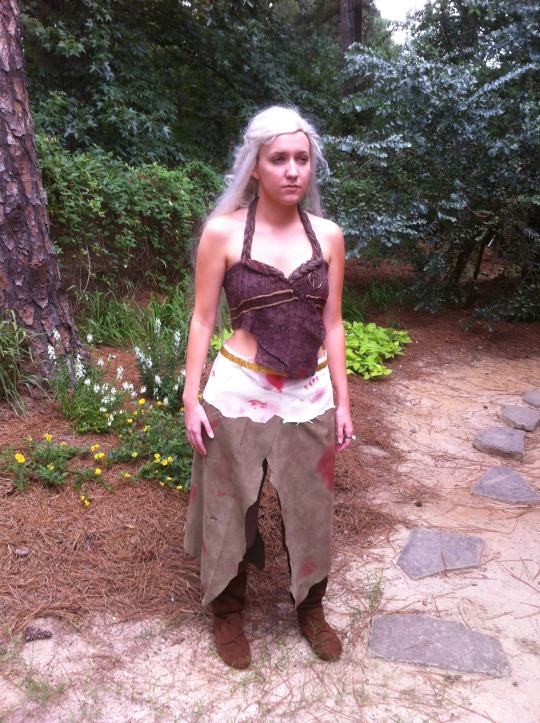
Chell from Portal
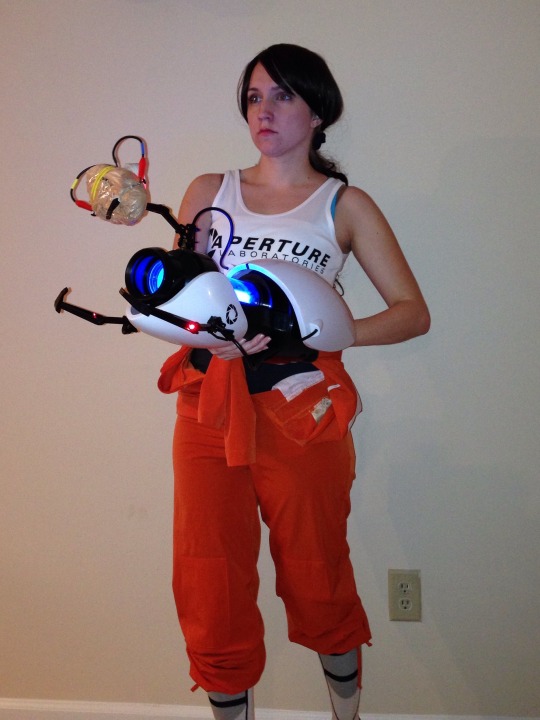
Luna Lovegood from Harry Potter
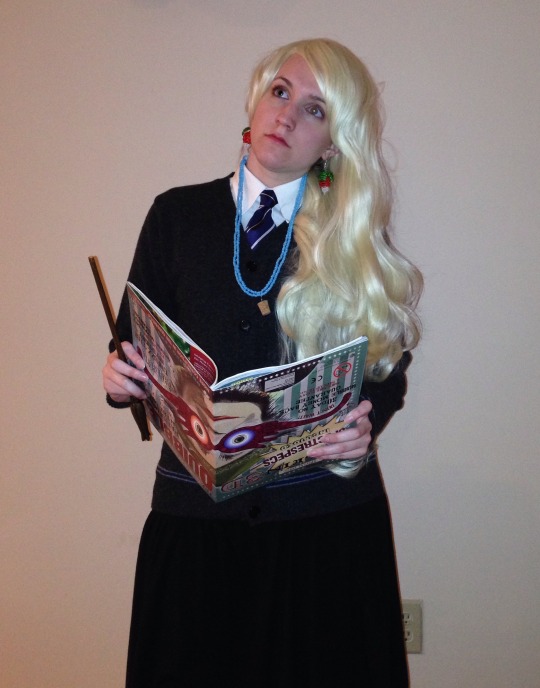
Elsa from Frozen

Joy from Inside Out

Eleven from Stranger Things

That was entirely too long, and I’m sorry.

If you read this far, you’re probably my soulmate. Please send me a message on Twitter and let me know. :)
0 notes